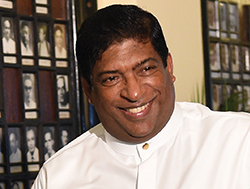Sri Lanka has emerged from decades of national unrest and is now fighting to combat corruption and instil fiscal discipline. Finance minister Ravi Karunanayake outlines the government’s new vision for economic development to Jacopo Dettoni.
Q: The Sri Lankan government recently announced a new five-year development plan. What kind of development do you envision for the country?
A: The necessity for a new development plan arose from the fact that we inherited a very troubled economy two years ago. Since then, we have consolidated the economy and introduced fiscal discipline. In the process, we looked at the [gaps] in the system. There are certain corrective actions that need to be taken and that’s what we put forward in the development plan.
Q: The need for a fiscal overhaul was one of the key elements of the $1.45bn, three-year extended fund facility arrangement signed with the International Monetary Fund [IMF] in June 2016 and a new Inland Revenue Act is on the way towards being implemented. What is the agenda here, and how do you see fiscal consolidation developing over the next years?
A: Fiscal consolidation is in motion. The Inland Revenue Act will be implemented from April 2017. We are looking at a fiscal deficit of 4.6% in 2017, gradually reducing it to 3% by 2020. On the public debt side, today we are in the range of about 80% of gross domestic product and aim to shrink it down to 60% in the next couple of years.
Q: Beyond structural reforms, what are the other priorities of the new development plan?
A: We want to transform economic activity to prioritise exports and maximise activity in certain services such as tourism, education and health to bring them to the economic forefront of the country’s development. With regard to agriculture, we want to [move] subsistence farming [to be commercially oriented] and thus industrialise the sector.
Q: Where do you see potential for Sri Lankan products to reach overseas markets?
A: The problem is that our export products and markets have not been diversified in the past. Our intention is to diversify both. So far, our traditional exports have been commodities such as tea, rubber and coconut, or products in garments or footwear. Moving forward, we will be looking at exporting business process outsourcing, and other services related to logistics support. In agriculture, once again the focus will be to make exports more competitive from a cost insurance and freight perspective through things such as [better] logistics support and freight services.
Q: Talking of logistics infrastructure, the government signed a multi-billion dollar deal on January 8 to lease out the Hambantota port to China Merchant Port Holdings. The previous administration of president Mahinda Rajapaksa was often accused of being too accommodating towards Chinese investment. What is your position?
A: The last government was being accommodating towards Chinese investment because there was so much corruption involved and they used it to fit their own purposes. On the other hand, we got in touch with the Chinese government to make it a win-win situation for both countries from the outset. That’s why there will be $5bn coming into the Hambantota industrial zone over the next years, with 100,000 jobs being created.
It’s not only about Chinese investment though – there is new investment from Japan, South Korea, India, Malaysia and European countries. We are making Sri Lanka an investment platform to reach out to the local market, but also to India, Pakistan and other future partners of free-trade agreements.
Q: The new government has not been spared criticism for its investment agreements with China though, with critics pointing out the generous concessions made to Chinese companies. What’s your position on that?
A: It’s ludicrous to think that we are being too generous. We are a sovereign country and we don’t relinquish our sovereignty for anything. We will get the jobs [through] the foreign action coming in, and we will make sure they pay taxes.
Q: Sri Lanka has historically struggled to attract foreign investment and even since the civil war ended in 2009, investment inflows have not spiked. What are you doing to make it a more conducive environment for foreign investors?
A: We lost 31 years through civil disturbance; [since] then the biggest deterrent has simply been corruption – it’s diminishing, but not fast enough. We have worked to make it very open for foreign investors to step in wherever Sri Lankans lack the technological know-how, setting up incentives and getting rid of antiquated legislation. Besides, the president and the prime minister are now regarded as two leaders working in the same direction, and the agreement with the IMF has also contributed to improve the perception of the country.



